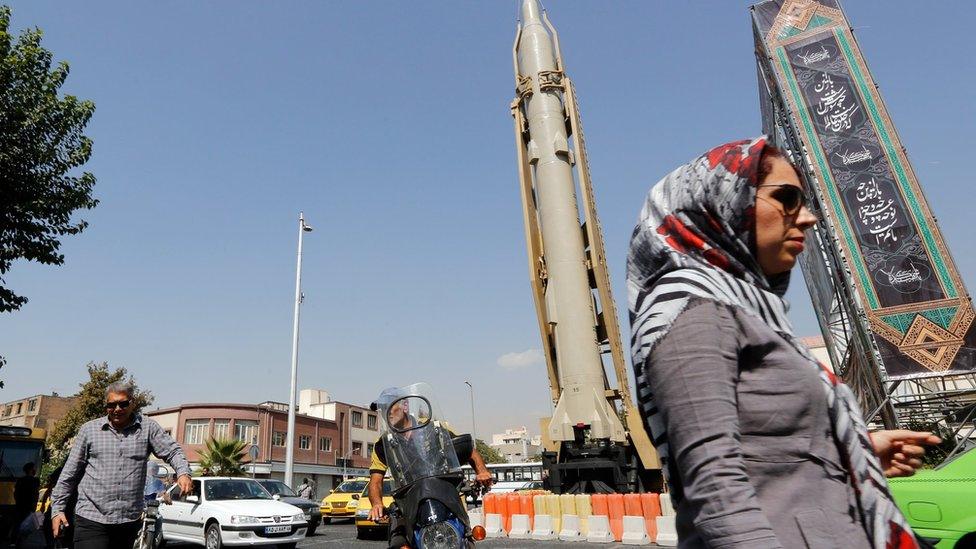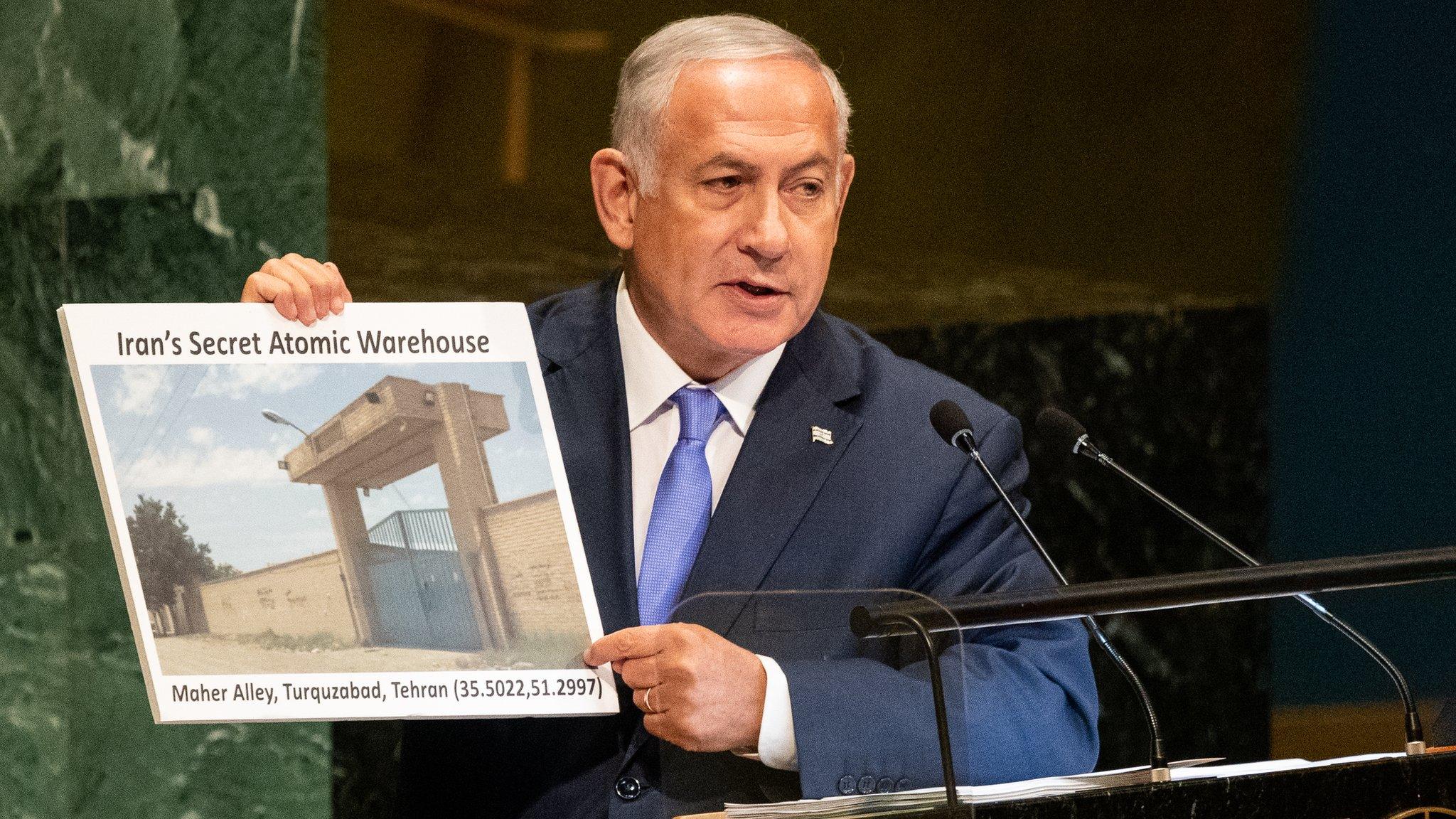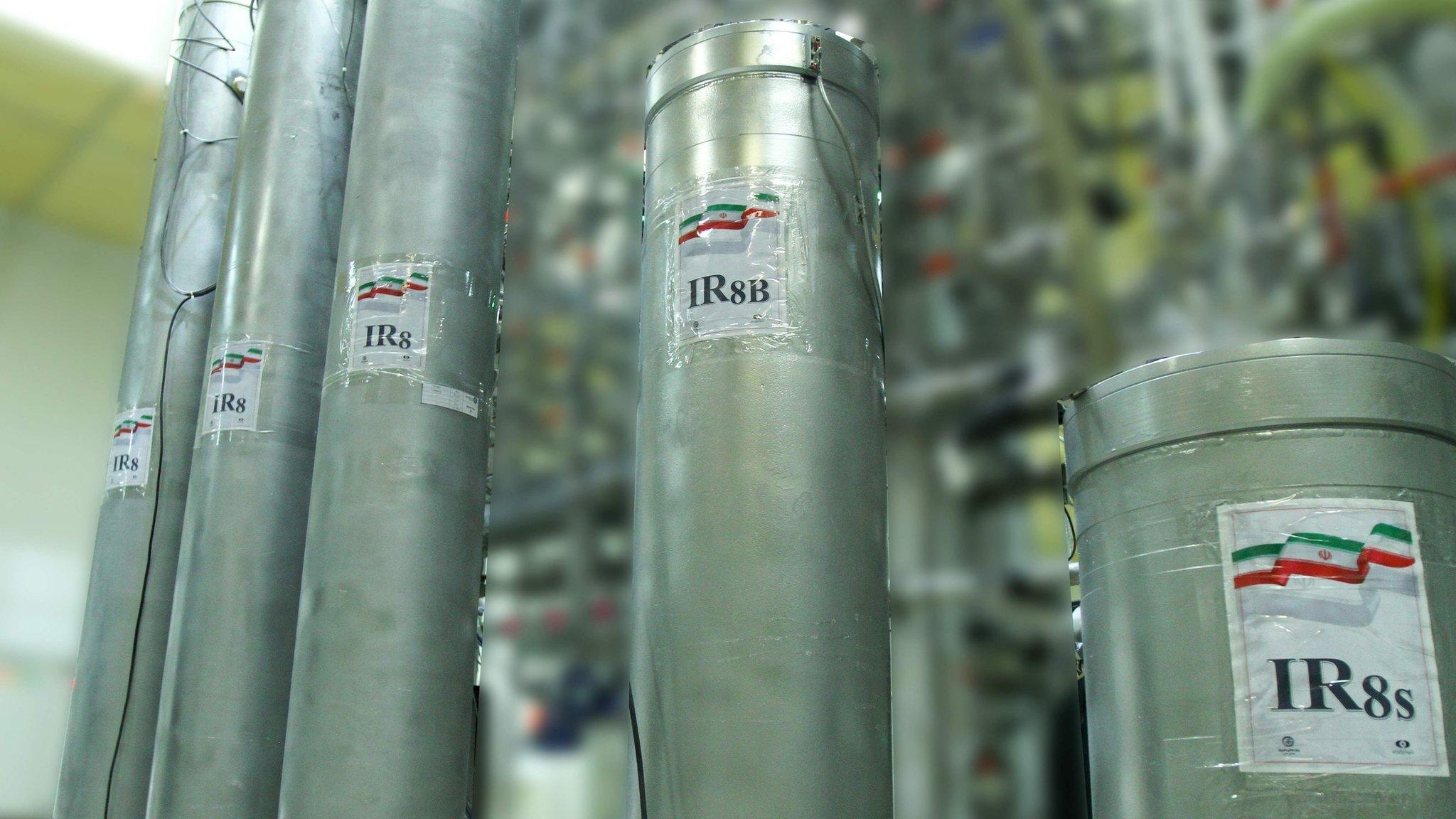Iran developing nuclear-capable missiles, European powers warn UN
- Published

Iranian forces put a Shahab-3 missile on display in Tehran during Defence Week in September
Three European powers have warned the UN that Iran is developing nuclear-capable ballistic missiles in violation of a Security Council resolution.
A letter sent by the UK, France and Germany says Iran tested a Shahab-3 missile variant "equipped with a manoeuvrable re-entry vehicle" that could deliver a nuclear weapon.
Such activity is "inconsistent" with a resolution endorsing the 2015 Iran nuclear deal, it argues.
Iran has denied the allegation.
Foreign Minister Mohammad Javad Zarif said the letter was a "desperate falsehood" put out by the European powers "to cover up their miserable incompetence in fulfilling bare minimum" of their obligations under the nuclear deal.
Allow X content?
This article contains content provided by X. We ask for your permission before anything is loaded, as they may be using cookies and other technologies. You may want to read X’s cookie policy, external and privacy policy, external before accepting. To view this content choose ‘accept and continue’.

Security Council Resolution 2231 "calls upon" Iran not to "undertake any activity related to ballistic missiles designed to be capable of delivering nuclear weapons, including launches using such ballistic missile technology".
Iran has insisted that its nuclear programme is entirely peaceful and denied that its ballistic missile programme violates the resolution.
But the European letter says that video footage of a test posted on social media on 22 April showed the use of a Shahab-3 booster that was "a Missile Technology Control Regime Category-1 system", according to the Associated Press, external.
As such, it was "technically capable of delivering a nuclear weapon".
Allow X content?
This article contains content provided by X. We ask for your permission before anything is loaded, as they may be using cookies and other technologies. You may want to read X’s cookie policy, external and privacy policy, external before accepting. To view this content choose ‘accept and continue’.

The Missile Technology Control Regime, external, which was established to address nuclear proliferation, says Category 1 systems are capable of delivering a payload weighing at least 500kg (1102lbs) a distance of at least 300km (186 miles).
AP said the letter also listed three other examples of Iranian activities that the UK, France and Germany considered to be "inconsistent" with resolution 2231:
The launch of a ballistic missile, external, reportedly a Shahab-3, on 24 July
The launch on 2 August, external of a Borkan-3 liquid-propelled medium-range ballistic missile by Houthi rebels in Yemen, whom Iran has been accused of arming
The unsuccessful launch, external of a Safir satellite launch vehicle on 29 August
Israel's Foreign Minister Israel Katz welcomed the letter, and instructed Israeli diplomats to present a "complete list of Iranian violations of the nuclear agreement" at a Security Council meeting on 19 December that is expected to discuss Iran.
Allow X content?
This article contains content provided by X. We ask for your permission before anything is loaded, as they may be using cookies and other technologies. You may want to read X’s cookie policy, external and privacy policy, external before accepting. To view this content choose ‘accept and continue’.
Iran has breached a number of commitments under the deal in recent months in response to US President Donald Trump's decision last year to abandon the deal and reinstate economic sanctions.
Mr Trump wants to force Iran to negotiate a new agreement that would place indefinite curbs on its nuclear programme and also halt its development of ballistic missiles. Iran has refused to negotiate unless the US first lifts its sanctions.
Feeling the squeeze: Iran sanctions explained
The five other parties to the deal - the UK, France, Germany, China and Russia - have tried to keep it alive. But the sanctions have caused Iran's oil exports to collapse, the value of its currency to plummet and the inflation rate to soar.
In a separate development, US officials said a US Navy warship deployed in the Gulf of Oman had seized advanced missile parts believed to be headed from Iran to Yemen. The parts were on board a small boat stopped last week, they said.
The US defence department also denied a report in the Wall Street Journal, external that it was considering sending dozens more warships, other military hardware, and as many as 14,000 additional troops to the Middle East to counter Iran.
- Published11 November 2019

- Published5 November 2019

- Published7 November 2019
